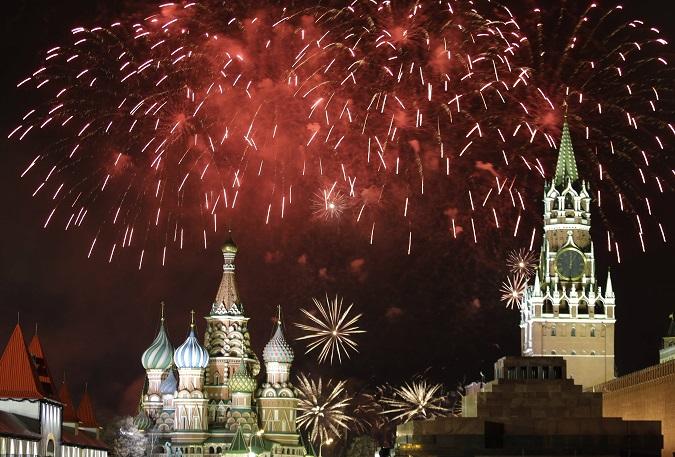Russia 2013 oil output reaches post-Soviet high
Bareksa • 02 Jan 2014

Fireworks explode in the sky during New Year celebrations in Moscow (Reuters/Tatyana Makeyeva)
Output up almost 1.4 percent to 10.51 million barrels per day
Reuters - Russia, the world's biggest oil producer, raised output to a post-Soviet era high of 10.51 million barrels per day (bpd) in 2013 buoyed by high prices and exports to China.
That was a rise of almost 1.4 percent and took production to 523.276 million tonnes, Energy Ministry data showed on Thursday.
The rise defied some predictions for a decline from aging oilfields in West Siberia, which together with natural gas sales generate over half of Russia's state budget revenues.
December's monthly production averaged 10.63 million bpd, also a post-Soviet high.
Russian oil output likely stayed above that of Saudi Arabia, which kept production steady at around 9.7 million bpd in October and November. Saudi data for December is not yet available.
Last year output grew at almost all of Russia's large producers, which boosted drilling as oil prices stayed above $100 per barrel and increased by around $3 per barrel on the domestic market thanks to increased demand for refining.
Lukoil, Russia's second-largest oil producer and top non-state oil company, managed to halt a decline in production seen in the last three years.
Lukoil's output rose by almost 2 percent to 85.8 million tonnes. The data covers production only in Russia. The company expects to boost its overall output with the launch of Iraq's West Qurna-2 oilfield this year.
Rosneft, the world's top listed oil producer after it acquired Anglo-Russian oil firm TNK-BP, produced an average of 3.1 million bpd in 2013.
Its Vankor oilfield in eastern Siberia increased output by more than 17 percent to 21.4 million tonnes or 430,560 bpd, still below a target of 500,000 bpd.
Vankor is a main source of Rosneft's oil flows to China, which it agreed to almost triple in coming years from more than 300,000 bpd in 2012. China will likely replace Germany as the largest customer for Russian pipeline crude in the first quarter of 2014.
Russia increased oil supplies to China via the East Siberia-Pacific Ocean pipeline to 15.8 million tonnes from 15.1 million in 2012.
Exports from the Pacific port of Kozmino reached 21.3 million tonnes in 2013 and are expected to rise.
OIL EXPORTS DOWN
Total oil exports to countries outside the former Soviet Union fell to 228.517 million tonnes from 234.314 million in 2012 as Russia ramped up oil refining.
According to pipeline operator Transneft, Russia cut its crude exports from ports by almost 4 percent to 136 million tonnes in 2013.
Oil exports from the Baltic Sea and the Black Sea ports, mostly Europe-bound, declined 8 percent on increased supplies to Asia.
Domestic refining output rose by 9 million tonnes reflecting Russia's $55 billion programme launched in 2011 to modernise its refineries.
Daily gas production rose to 1.83 billion cubic metres (bcm) from 1.79 bcm in 2012.
Gazprom, the world's top gas producer, saw its output slip to 1.30 bcm per day from 1.31 bcm in 2012 although its exports to Europe jumped 16 percent to reach a record 161.5 billion cubic metres. (Reporting by Vladimir Soldatkin; editing by Patrick Graham and Jason Neely)